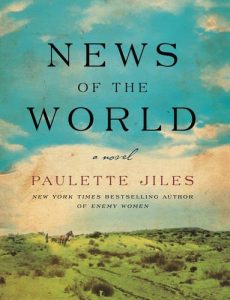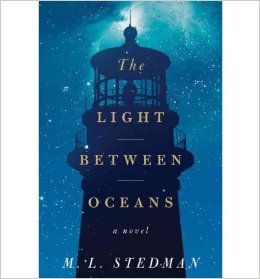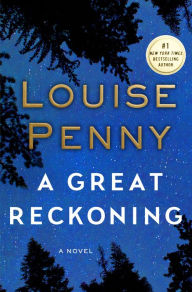News of the World by Paulette Jiles
 News of the World
News of the World
by Paulette Jiles
You may remember THIS post, where I had just finished an exceptional book but still in proof/advanced reader’s format. It’s been driving me slightly crazy, but I had to keep silent as the original publication date (March) had been pushed back to October.
Today News of the World is released and I can finally tell you about what other reviewers are calling a “gem” of a book. And I agree wholeheartedly, News of the World is just that — a “must have” gem.
This short novel (200 pages) is set just after the Civil War in 1870’s Texas. Captain Jefferson Kyle Kidd is a widower in his seventies who fought in two wars. A former printer, the captain enjoys a vagabond existence as a news reader. He travels to small towns in Texas, reading the news from a wide range of newspapers. His audiences, who either can’t read or don’t have access to the newspapers Kidd orders from around the world, pay a dime admission to hear the news from as far away as London or New York.
The Captain is mindful about what he reads, sometimes skimming over politics or post Civil War uncertainty, and always ends his readings with a fascinating or exotic tale.
One evening the Captain is approached by a freed slave who is traveling with an orphaned German-American girl. Now 10 years old, Johanna was taken captive at age six, by the Kiowa during a raid during which her parents and sister were slaughtered. Now, four years later, she has been sold by the Kiowa to the army for a few blankets and some old silverware. The child must somehow be returned to her uncle and aunt who live 400 miles away near San Antonio. The freed slave, a black man, is reluctant to be traveling with a white girl child through territory still reeling from the aftermath of the Civil War. Kidd accepts the monumental sum of $50 to take the girl back to her relatives and he plans his news readings to follow a route that will eventually take them to San Antonio.
Thus begins a journey through the beautifully described Texas hill country. The relationship between the Captain and the reluctant, Kiowa speaking Johanna grows close and protective as they journey towards their destination. She calls him “Kep-dun” and he teaches her English name which they agree will be pronounced “Chohenna”. She distastes shoes and grapples with the many layers of woman’s dress of the time. The aging Captain, meanwhile is trying to protect them from marauding Indians, cowboys and rove soldiers while simultaneously showing her how to eat food with utensils and to use a gun.
There are harrowing attacks, harsh weather and long boring days in a wagon and while their journey is suspenseful and often amusing — it is mostly heartwarming as they start to form an unlikely affection for each other.
News of the World is chocked full of details — of horses, weapons, dress, and society’s attitudes at the time — but rather than weigh down the story, these details bring it alive for the reader.
With Johanna, Ms. Jiles beautifully renders the trauma and readjustment of children captured and adopted by Native Americans. And Captain Kidd is one of the finest western characters ever written — reminiscent of Lonesome Dove or True Grit.
I especially savored Captain Kidd’s newspaper readings which are filled with fascinating (there’s that word again) historical references of the time, from arctic explorers to the politics of Hamilton and Davis.
This is historical fiction at its best, with a riveting story line, memorable characters, and writing that is graceful and spare. And if you’re like me, you need a few moments to compose yourself after the ending.
News of the World is up for the National Book Award and is at your independent bookstore today. Highly recommended.
An Advanced Readers Copy was provided by William Morrow, a division of Harper Collins publishers.
In the Woods by Tana French
Years ago, I used to devour those quick, cozy, connect-the-dots mysteries, often reading nothing else for months on end. Then, suddenly, I ground to halt, having grown tired of the often predictable plots and one-dimensional characters. I vowed to only read mysteries that were well written, with intelligent plots and fascinating characters.
I voiced my new resolution and high standards to my bookgroup at the time and was quickly introduced to a range of authors including Deborah Crombie, Elizabeth George, and Peter Robinson On my own, sans bookgroup, I’ve since discovered Louise Penny, Kate Atkinson, and Susan Hill. So, my mystery reading days are back in full swing.
Thanks to a friend’s urging, I’ve just discovered a new series and author — Tana French. I must have been under a rock, because In The Woods (her first in the series) was published in 2007. I was aware of this book, having seen it over the years. But, look at that cover — doesn’t it look like a horror filled, psychological thriller? Shame on me for judging a book by its cover.
In the Woods immediately pulls you in, the terrifically written prologue sets the stage and puts the reader into a carefree summer day in a 1984 suburb of Dublin with three children playing in the woods.
When the children don’t return home, only one child, Adam Robert Ryan, is found catatonic, remembering nothing but his shoes are soaked with blood. Now twenty years later, Ryan, going only by Adam Ryan, is a detective for the Dublin Murder Squad. No one knows of his connection with the 1984 incident. A young girl is found murdered in the very same woods and Ryan finds himself in his old hometown which triggers memories of what happened on that tragic day.
In the Woods is narrated by Detective Ryan and Ms. French has given him a complex voice – taunted by the past, torn up with survivors guilt and the hard, cool viewpoint of a detective.
What I warn you to remember is that I am a detective. This is my job, and you don’t go into it — or, if you do, you don’t last — without some natural affinity for its priorities and demands. What I am telling you, before you begin my story, is this — two things: I crave truth. And I lie.
Detective Ryan and his partner from the Dublin murder squad, Cassie Maadox, begin their gentle but relentless investigation into the death of young Katy Devlin. Their relationship is intricately developed and compassionate.
How can I ever make you understand Cassie and me? I would have to take you there, walk you down every path our secret shared geography. The truism says it’s against all the odds for a straight man and woman to be real friends, platonic friends; we rolled thirteen, threw down five aces and ran away giggling. She was the summertime cousin out of storybooks, the one you taught to swim at some midge-humming lake and pestered with tadpoles down her swimsuit, with whom you practiced first kisses on a heather hillside and laughed about it years later…
Ms. French deftly weaves back and forth between the two plots and it’s fascinating to see if two murders relate or are a mere coincidence. The interrogation scenes are some of the best parts of this debut;
It becomes second nature, interrogation; it seeps into your blood until, no matter how stunned or exhausted or excited your are, this remains unchanged: the polite professional tone, the clean, relentless march as each answer unfolds into question after new question.
There is rich atmosphere, from the Irish weather;
It was your basic Irish summer day, irritatingly coy, all sun and skidding clouds and jackknifing breeze, ready at any second to make an effortless leap into bucketing rain or blazing sun or both.
To the murdered girl’s autopsy;
I thought of the old superstition that the soul lingers near the body for a few days, bewildered and unsure
In the Woods is atmospheric and engrossing, with richly drawn characters and some lovely detailed writing. Hard to fathom that this is Ms. French’s first novel.
I read most of the day – couldn’t put it down. The ending does not tie up all the loose ends but I’m hoping the next in this intelligent series will start to resolve some of the questions.
Out of my way folks — got to get to the library for the next one, The Likeness.
Warning, the crime(s) are graphic and do involve child rape.
The Light Between Oceans by M.L. Stedman
Some people have this problem…
I never do, I always — always race to read the book before seeing the film. I even avoid the trailers as I don’t want the character images in my head shattered by the Hollywood portrayal.
 The Light Between Oceans is a enthralling tale, capturing me from this first line:
The Light Between Oceans is a enthralling tale, capturing me from this first line:
On the day of the miracle, Isabel was kneeling at the cliff’s edge, tending the small, newly made driftwood cross,
This is a debut novel by M.L. Stedman, who was born and raised in Western Australia. Her knowledge and descriptions of the coast of Australia are beautifully rendered. There’s even a map at the beginning. (I love me a map with a novel). The author has also done her homework on light houses — but I’m getting ahead of myself.
Tom Sherbourne has miraculously survived World War I, but only just. Still shattered, he is hired to keep the lighthouse on Janus, an island off the coast of Australia. As the sole inhabitant of the tiny island, he finds comfort with the precision and routine of manning the lighthouse;
Stick to the solid. To the brass fittings which had to be polished, the glass which had to be cleaned. Getting the oil in, keeping the cogs moving, topping up the mercury to let the light glide. He gripped each like a rung of a ladder, by which to haul himself back to the knowable; back to his life.
But then during a break on the mainland, he falls in love with Isabel, they marry and return to the island to run the lighthouse together. The chapter where he shows Isabel around the lighthouse and explains how it works is pure magic with lovely descriptive writing. Isabel sees the lighthouse as…”a palace of prisms, like a beehive made of glass”.
At this point in the story I believe the reader should adapt what is called a willing suspension of disbelief. Isabel and Tom have suffered two miscarriages and tragically, a third stillbirth.
A few weeks later, a canoe washes ashore containing a dead man and a live baby girl. Tom wants to report the dead man and take the baby to the mainland to find her family — but Isabel begs him to keep the child. He reluctantly agrees and this begins the cycle of consequences.
Thus, the suspension of belief – I kept reading, entranced but amazed at their actions. They bury the man and keep the baby. Both Tom and Isabel fall completely in love with the little girl they name Lucy. When they found Lucy, all that was with her was a beautiful silver rattle. There is no other identification.
Do they wonder about the baby’s grieving family on the mainland? Don’t they want to know the circumstances of the man’s death, not to mention his identity? Aren’t they concerned by the fact that they have broken the law? The couple suspend all rational actions and thoughts, and they blithely build their idyllic life on the island, with their magic baby.
Now dear readers, we’re at the middle of the novel and this is where my willingness to suspend belief almost became a willingness to suspend reading. But, I had to carry on, keenly interested to know the outcome for our little family on the island.
Now we read through redundant circles of Tom grappling with his love and loyalty to Isabel and his sense of morality of what they have done We experience the anguish and consequences of the decisions made, and not made. We meet the real mother and discover how nothing is purely right or wrong — all beautifully written but overwrought. In the back of my mind I kept thinking, “This would make a great film”.
The second half of the book is stoked with pathos and emotions on full power. And the ending, though probably right and ultimately quite moving, leaps over many of the key events – leaving much for the reader to question.
I gave my copy of The Light Between Oceans to a departing house guest and decided to only say, “this will be a great plane book” – which I am positive it will be.
Because, despite my criticisms, I was smitten by this best-seller and I kept reading to the end. I’m sure it will make a lovely, tear jerking, Hallmark sort of film — not to mention, a very successful new author.
If you want to see the film trailer before reading this novel you can see it HERE.
Very sad news…
If, like me, you’re a fan of Louise Penny ~ there is sad news tonight.
Her beloved husband, Michael passed away. He suffered from dementia and his long good-bye is gently over.
Here is her eloquent and simple farewell,
Michael passed away last night, at home, at peace, with love. “It’s not so much that his heart stopped, as that he’d finally given it all away.” Surprised by joy.
I harbor no hubris that Ms. Penny has ever visited Book Barmy, but I hope you, my loyal readers, will join me in sending our collective comfort out into the universe for her.
Thank you, Ms. Penny for sharing your journey with your comrade and partner, Michael. You wrote of your love with honesty and grace.
May peace slowly come to you, even as your grief ebbs and flows, and may his light be all that remains.
Surprised by joy…
News release from CBC HERE
The book before the film…
 The Light Between Oceans
The Light Between Oceans
by M. L. Stedman
I recently saw a trailer for this film (opening this weekend) and I vaguely remembered I had a copy somewhere and unearthed it in my toppling stacks collection of TBRs.
Curious, but also a firm believer in reading the book before seeing the film, I gave it go.
The Light Between Oceans just plain riveting, it’s got me hooked. I’m on the last third of the book, so a review will follow.
So, before venturing to the theater this weekend, may I suggest you venture instead to your local independent bookstore or your local library and read the The Light Between Oceans first. I’ll be telling you why shortly.
+++++++++++++++++++++++
In the meantime, Husband and I are headed to the Sierras for a week-long hiking trip.
Before you imagine us lugging big packs and sleeping bags, it’s going to be a week of day hikes. Each hike to be followed by a soak in a hot tub, a refreshing shower and a nice meal before falling into a real, bonafide bed. (The vision of the hot tub is all that keeps me going for the last 2-3 miles, the mantra in my head “hot tub, hot tub… repeat”.)
There’s also this ~~
I rest my case…
A Great Reckoning by Louise Penny
 A Great Reckoning by Louise Penny
A Great Reckoning by Louise Penny
It’s finally here! Today, the new Louise Penny is released. Now, if you took my previous post heed, you called in sick to work, cancelled all appointments, and this morning, you were at your local independent bookstore as it opened. Now you’re installed in a coffee shop or back home about to settle in with this latest installment in Ms. Penny’s stellar Inspector Gamache series.
So how to tell you about A Great Reckoning without giving too much away? Very carefully, I promise, no spoilers here.
I can start by admitting I fell hard for this book and didn’t come up for air for a couple of days (Husband calls this “she who is with book” and gamely forges for his own dinner and watches TV on low volume.)
A Great Reckoning opens in Three Pines where Gamache and Reine-Marie are still living their idyllic life in the village (how they both don’t weigh 300 pounds is beyond comprehension);
The next morning Reine-Marie invited her husband to breakfast at the bistro. Henri came along and lay quietly under their table as they sipped bowls of café au lait and waited for their maple-cured bacon with scrambled eggs and Brie. The fireplaces on either end of the long beamed room were lit and cheerful, conversation mingled with the scent of wood smoke, and there was the familiar thudding of patrons knocking snow from their boots as they entered.
I can also tell you, that the mystery begins with an old map found boarded up in the walls of the bistro. At first, the map seems to be no more than a curiosity. But the map uncovers village secrets from WW I, and leads Gamache to an old friend, and even older adversary and to places he wishes not to re-visit.
Gamache, the retired Chief of Homicide for the Sûreté du Québec has been taken out of retirement and assigned to takeover the Süreté ‘s cadet training academy. Gamache seems invigorated and firing on all cylinders as he confronts corruption, greed and possible abuse at the cadet academy.
Ms. Penny always has a theme running through her novels and A Great Reckoning is about misfits and the myriad ways they are flawed and judged. Misfits who have been wounded but survive and learn to thrive – and even shine. (Ruth and her foul mouthed duck are, of course, a prime example of such shining misfits.) From the cadets at the academy, to Gamache’s old friend, to the commanding officers at the academy – we recognize these misfits at every turn. Yet they are depicted with compassion and intelligence. Once again, Ms. Penny brings humanity to even her most damaged and suspect characters.
A Great Reckoning, like all the others in this series, is chocked full of fascinating historical and cultural perspectives. This time we learn about maps, early map makers and their vital role in uncharted territory explorations. In terms of current culture, there’s always some new insights for non-Canadians. We get a glimpse into maple sugaring and a typical “sugar shack” as well as, the oddities of Quebéc communications;
They were in the odd position, as sometimes happened in Quebéc, where the Francophone was speaking English and the Anglo was speaking French.
But some of the observations are applicable to any country and its politics:
“A man driven by an infected ego. But he was also a powerful man, I’ll give him that. A charismatic personality. Stupidity and power. A dangerous combination, as we’ve found out many times, eh Armand?”
Long time fans of Ms. Penny will be pleased with the delightful humor and witty rapport between the quirky, but lovable, Three Pines villagers;
Myrna sat down heavily on her side of the sofa, almost catapulting Ruth into the air. “I always suspected Ruth would end up a stain on the wall,” Gabri said to Clara. “But, I never thought the ceiling.” He turned to Myrna. “I’ll give you five dollars to do that again.”
Ruth is her usual cranky self when confronting a breakfast meal being served for dinner;
“How long have I been asleep?” asked Ruth looking down at her plate. “Victoria is no longer on the throne, if that’s what you’re wondering,” said Myrna. “The good news is, we do have another queen,” said Oliver glancing at Gabri.
The final chapter – again I’m being careful not to give anything away — showcases some of Ms. Penny’s best writing with guns as metaphors and surrender of same — as redemption. I read it twice, as it was that subtly crafted.
But what brought actual tears to my eyes was after the novel ended — in the afterword. Here, Ms. Penny lovingly acknowledges Michael’s (her husband) dementia and writes of her gratitude to his doting caregivers, as well as her readers for giving her the support and encouragement to keep on writing despite this heartbreaking situation. (She’s already well into writing the next novel.)
So in summary, A Great Reckoning gets not only my glowing review, but a standing ovation.
If you’re new to Louise Penny’s intelligent, and often brilliant series, you should start at the beginning with her first, Still Life. You can see why she’s one of my most admired authors HERE, HERE and HERE.
Now I’m off to make something special for poor Husband’s dinner, — maybe a breakfast for dinner?
A digital review copy was provided by St. Martin’s Press via NetGalley









